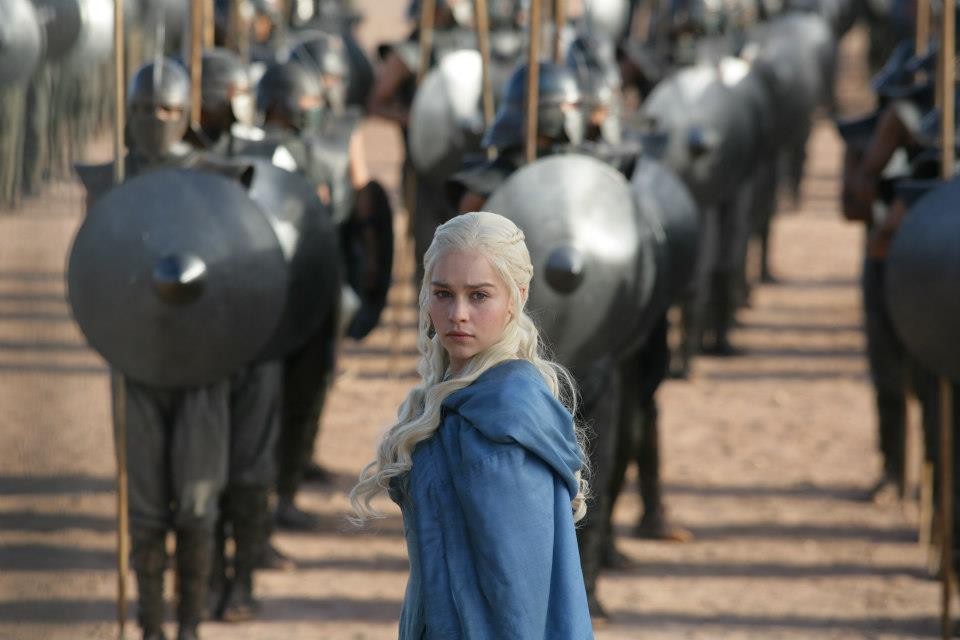Rather than go through the individual scenes or discuss the underlying themes of this, the ninth and thus traditionally most shocking and plot-intensive episode of a Game of Thrones series, I wanted to discuss the actual event which dominated this episode: the Red Wedding.

I only came to the A Song of Ice and Fire book series a couple of years ago. I bought the first book when it was £3 on Amazon, and then it languished on my bookshelf for another two years, one of a varying-height pile of unread books. When I did get around to reading A Game of Thrones, I was utterly absorbed and bought into the series immediately. Frantic further purchases followed as I plowed through the second and then the third book, the basis for this current series.
When I got to the Red Wedding chapter in A Storm of Swords, I shared much of the shock which spread through Twitter like a virus last night, as the Americans and then those watching the show through other means witnessed the scenes which I read: I remember stopping and putting the book down, astonished at what I’d just read. One viewpoint character, one main character and numerous interesting secondary characters all snuffed out, killed in a complete contravention of the rules of hospitality set so clearly in the books and the religion the Freys follow. I went back and re-read it, ensured that I’d not missed something vital, some hint that I hadn’t just read what I had… but there it was, in black and white. The King in the North was dead.
This scene is apparently something of a bone of contention amongst A Song of Ice and Fire fans. Many stopped reading when the Red Wedding was shown, viewing it as a betrayal of trust or a horror too far. Martin still gets people writing to him, apparently, saying that they had to put his series aside because of the Red Wedding, the startling brutality and a perceived lack of trust between him and the reader.
I find this somewhat strange, I must say. In the first book, the character you’d normally position as the hero was beheaded at the whim of a cruel boy king. In the second, Tyrion finally proves his worth to his father through cunning and strategy, only to be cut down and have his acclaim stolen from him. Even before the Red Wedding, Lord Mormont is killed by treacherous Crows. There are countless stories and accounts of brutality in the story, and yet people feel that Martin went too far somehow: a ‘hero’ was killed, a character people identified with, as was the varyingly-popular Catelyn Stark.
My view is that, if anything, it increases the tension and the historical authenticity, if not accuracy, of the Song of Ice and Fire books. Twice in Scottish history, the customs and laws of hospitality were broken, such as the Massacre of Glencoe, and Martin has always said that he takes his influences from actual history and the politicking and scheming of our ancestors. And if viewpoint characters can die even when they seem to be at their least vulnerable, well, you know that the stakes are high and feel more invested in these characters.
I get how people can be unhappy with a story where the ‘bad’ folk win and the good suffer, but there is a certain element of life in that. If Joffrey’s horrible murders and torture, the near rape of Sansa Stark, the brutality of the Tickler (someone who the TV audience did not have to witness) or the brutality of the Khaleesi’s war of conquest have not warned you before then that A Song of Ice and Fire was to be, magic and dragons aside, a realistic and visceral piece of art then I don’t know what more Martin could have done to let you know. Seriously. It seems baffling to me.
Viewers have even less reason to stop watching, I feel, as you’ve seen what’s happening to Theon Greyjoy. In the books, we don’t discover it until he is far further into his ‘mistreatment’. Not only that but you outright know Joffrey has killed for sexual pleasure. This was a brutal and vicious scene but not one that reveled in the violence. I think it was staidly put, for a massacre, and Arya’s presence was very well handled and subtle… until The Hound knocked her out and lifted her up.
To me, the Red Wedding sums up the world of Westeros. A veneer of respectability and formality, of connections between houses and diplomacy, was ripped apart for brutal, violent bloodshed. The women were particularly disregarded, mere objects to the men who claim dominion over them, and it was they who suffered most from the act. In a terrible eruption of the war and barbarism of a medieval world, a plan to destroy a political enemy was played out by distant puppeteers and the very-much close Lord Bolton. Those eight-to-ten minutes were Westeros, and large elements of our own history and nature, summed up.
And now the rains weep o’er his halls, with not a soul to hear…
UPDATE:
On reflection, my only issue with the #GoT depiction of the Red Wedding was how much it focused on the murder of women: Jeyne wasn’t even at the Red Wedding in the books. Her death was needless, over the top and troubling. I think that could be a daft decision to have made, and a very legitimate reason for people to turn from the series.



